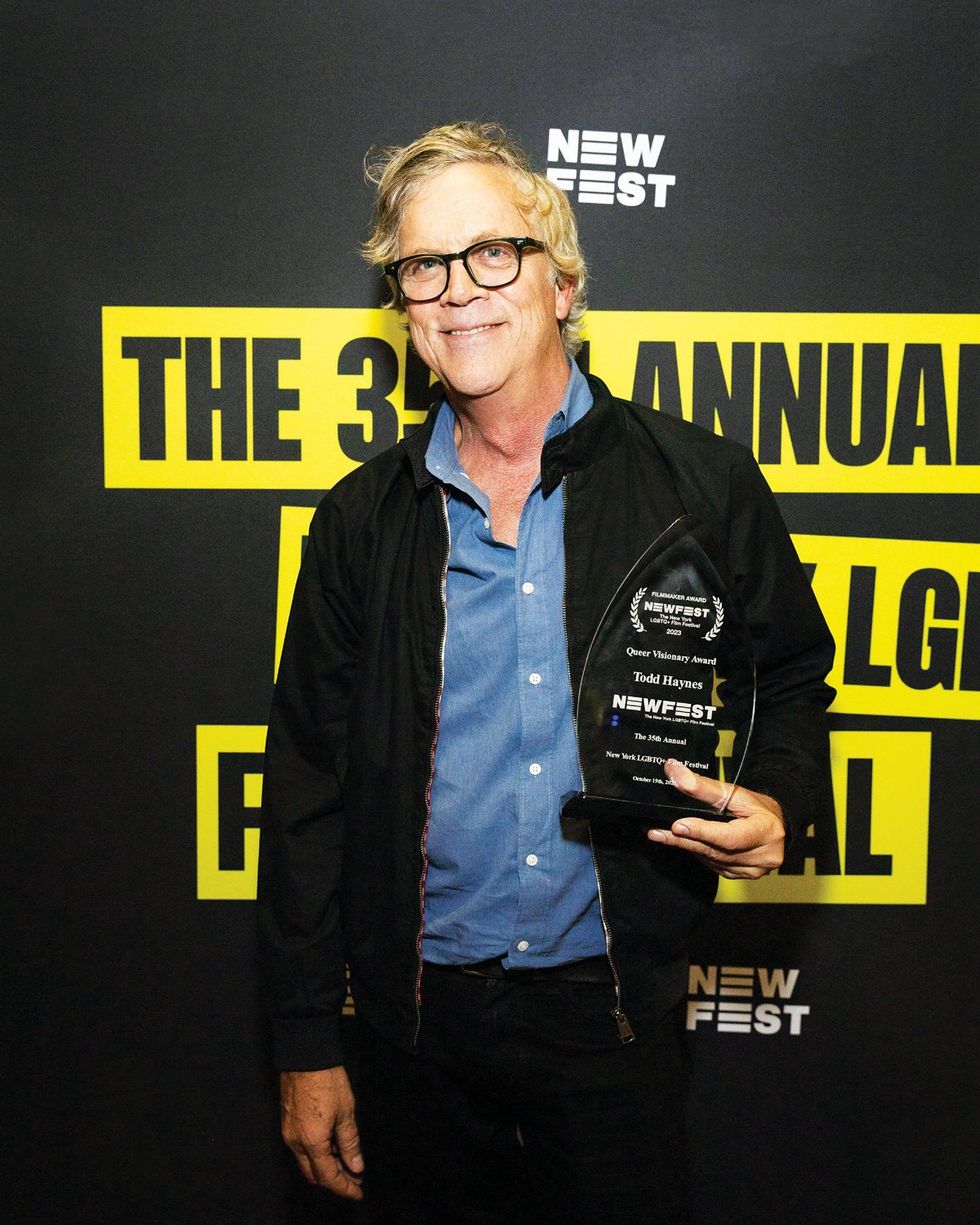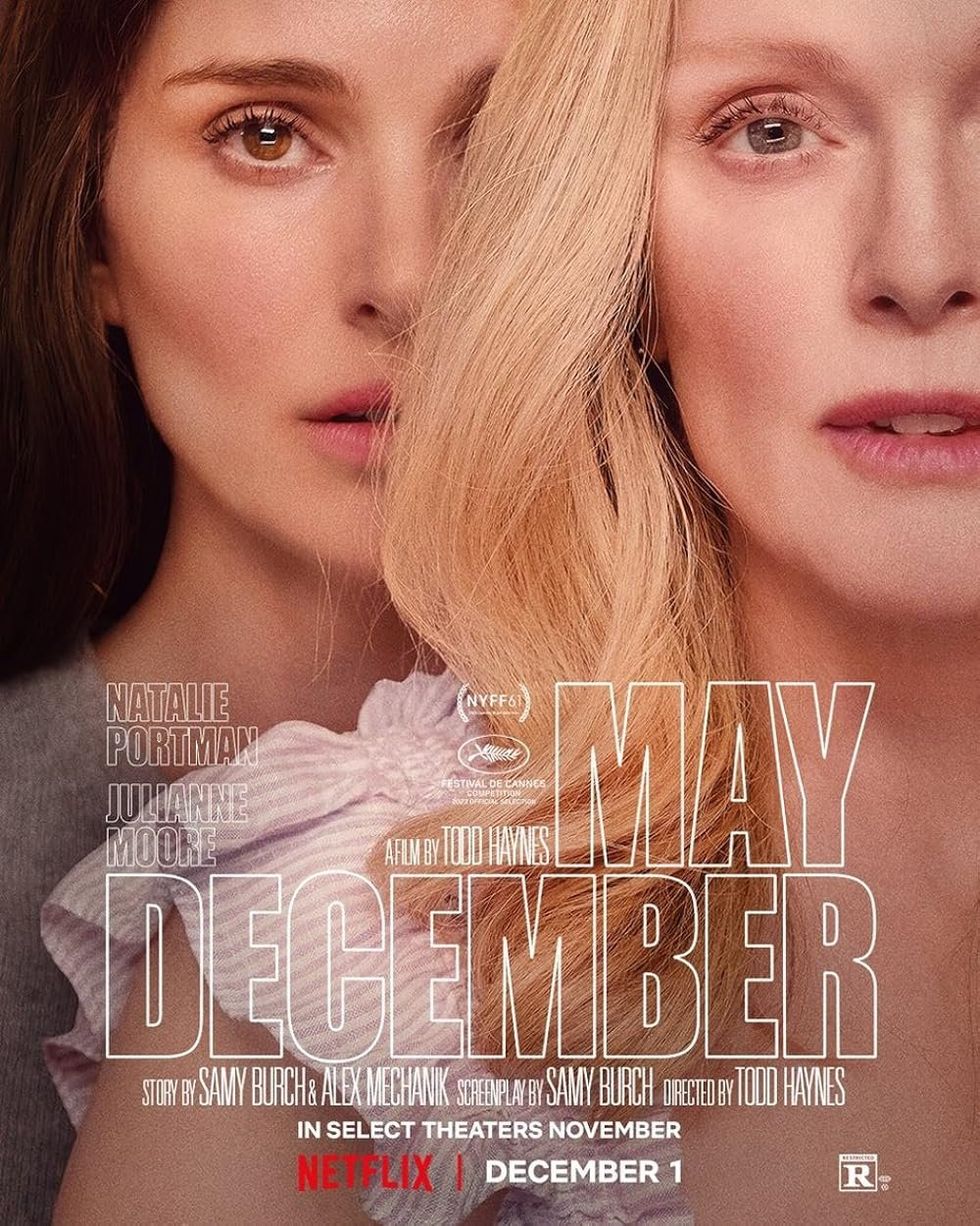A scene in Todd Haynes’s May December unfolds in a dressing room where the character Gracie, a tabloid media subject, is reflected in a mirror. Between Gracie and her reflection is Elizabeth, the actress who will play her in a film about the scandal that began decades earlier. The actress begins to mimic Gracie’s mannerisms. Meanwhile, Gracie delivers a backhanded compliment to her teen daughter about her bravery in showing her arms in the graduation dress she’s trying on in the store. The effect of the actress studying and regurgitating Gracie in real-time as the mother imparts harmful cultural mores about women to her daughter while it’s not clear which is the real Gracie and which is the reflection — is thrillingly uncanny. And it’s vintage Haynes.
Keep up with the latest in LGBTQ+ news and politics. Sign up for The Advocate's email newsletter.
A progenitor of New Queer Cinema since his 1991 film, Poison, became a Sundance Film Festival breakout, Haynes’s films have long investigated so-called social norms through the lens of women and/or queerness. From Superstar: The Karen Carpenter Story, his 1988 film that deployed Barbie dolls to tell the story of legendary singer Karen Carpenter’s fatal struggle with anorexia nervosa, through May December, his films centering women are steeped in the expectations placed on them.
“What you see are cultural legacies and the way femininity is learned. And the way these are institutionalized ways of learning how to socialize and be attractive and fit a certain body size,” Haynes says of Gracie’s embodiment of those ethos.
Later, it’s revealed that Gracie — played by a five-time alumna of Haynes’s films, Julianne Moore — gifted her elder, college-aged daughter with a scale for graduation. “Gracie did not invent [the pressure for women to look a certain way]. She is carrying it on. ‘Try going through your life without a scale. See how that works?’” Haynes says, repeating one of Gracie’s lines from Samy Burch’s richly textured screenplay.

“Every woman in the world recognizes themselves somewhere in that scene in the dress shop and in that line about the scales. Therefore, it’s not about Gracie. It’s about our culture. That we’re all the products [of culture],” Haynes adds. “That’s the insight that I think the script brings. And I think all these actors understood. That’s where it becomes a more universal story, even with all its excesses.”
In its uncompromising depiction of women’s place in culture, May December shares a pedigree with Haynes’s other films that center on women, including 1995’s Safe, which starred Moore aspiring to be the perfect San Fernando Valley housewife while struggling with an environmental affliction that may or may not be the result of chemicals of modern life like those found in cosmetics and cleaning products. In Far from Heaven (2002), Haynes’s nod to Douglas Sirk’s All That Heaven Allows, Moore stars as a 1950s Connecticut housewife hemmed in by expectations of femininity and propriety placed on her even while her closeted husband gets to start a new life with a man. With 2015’s Carol, based on Patricia Highsmith’s 1952 novel, The Price of Salt, he trained his camera on what those strictures mean for queer women. Cate Blanchett’s Carol navigates the performative nature of womanhood in the 1950s compounded by her desire beyond societal norms when she falls for Therese, a shop girl played by Rooney Mara.
Viewers may recognize that May December is loosely inspired by the crimes of Mary Kay Letourneau, a 34-year-old teacher who became pregnant with the child of the 13-year-old student she raped. The ’90s tabloids fervently cashed in on her story, following it as she served her prison sentence and married the father upon her release. But May December, which hinges on the arrival of Natalie Portman’s singularly minded actress, Elizabeth, arriving in Savannah to study Gracie and her decades younger husband Joe (Charles Melton), resists rehashing tabloid fodder. In the character study of two women whose identity becomes more slippery and intertwined as the film unfolds, only Joe reads as a trustworthy storyteller.
“[Blurring of boundaries] literally becomes a subject in the dialogue of the film by the end about not knowing where these lines are. That’s something that one experiences watching the film that we wanted to preserve and, in fact, make a kind of delicious dark demand on the viewer,” Haynes says. “This is not the way we usually approach our content, quote-unquote, these days in, movies and TV. We usually like to know what we think about things and have it be confirmed by the movies that we watch. This film really destabilizes you in all these ways.”
New York’s LGBTQ+ film festival, Newfest, honored Haynes with its Queer Visionary Award last October. While May December — in part a nod to Ingmar Bergman’s classic Persona — is not an LGBTQ+ film per se, it is of a piece of his queer canon. There’s something deeply queer in the eliding of boundaries between the women. In one scene, Gracie ostensibly teaches Elizabeth about the color and application process of her cosmetics. As Gracie, with her pointed, almost malevolent feminine power, dabs a dark hue onto Elizabeth’s lips, there’s an exchange of power, setting Elizabeth off balance.
“This actress who’s seeking the truth comes in and is she going to be a reliable narrator? She starts crossing lines and becoming craven about her ambitions. You start to lose your faith in her as you start to re-examine, or at least have various kinds of feelings about Gracie’s character as the film unfolds,” Haynes says.
“Ultimately, it opens up space for Joe. And that becomes a place where we can invest some hope, potentially, for somebody who can maybe look at themselves in a way that neither of these women are capable of doing,” he adds.
In her first meeting with Gracie, Elizabeth borrows a phrase that is widely used in queer culture around the idea of validation and identity. She ensures Gracie that her performance will be sensitive because she wants her to “feel seen.”
It’s a searing moment that Haynes credits to Burch’s “dark humor” that “completely played into Natalie’s mischievous, dark take on a story about the arrogance and the presumptions of our industry, and of actors who want to provide the truth for everybody and feel in some unexamined place where they get to decide what that truth is.”
May December offers no easy resolution, but while the women parry and cross boundaries, Joe’s story is aligned with the journey of the monarch butterfly he nurtures and sets free.
“It becomes a sort-of cyclical search for the real Joe, the true Joe, the true story that the film, I think, pretty much tells you is unachievable,” Haynes says.

















